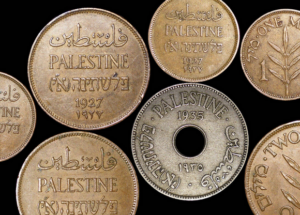How the UN Gaza resolution creates new foreign ‘mandate’ over Palestinians

Multilingual coins from Mandate Palestine
Rayhan Uddin writes in Middle East Eye on 18 November 2025:
An international force will use “all necessary measures to carry out its mandate” in Gaza, a newly approved United Nations Security Council resolution stipulates. The resolution puts US President Donald Trump in control of the Palestinian enclave, with multinational troops in an “International Stabilisation Force (ISF)” overseeing his 20-point plan for its future.
The term “mandate” is all too familiar in the context of foreign involvement in the affairs of Palestinians.
“This is a classic colonial scheme which totally disregards the rights and aspirations of the indigenous people,” Avi Shlaim, the British-Israeli historian, tells Middle East Eye. “In this sense, it is comparable to the British Mandate for Palestine.”
Helena Cobban, author of the book Understanding Hamas: And Why That Matters, said that on one level, “mandate” is just a technical term. “But for everyone throughout West Asia, it carries heavy historical baggage,” she told MEE. “The post-WW1 mandates awarded to Britain and France in formerly Ottoman areas were predicated on the inherently colonialist assumption that the peoples of those regions somehow weren’t ‘ready’ for self-governance.”
Almost a hundred years later, global powers are once again taking charge of Palestinian territory for what is described as a “transitional” period.
Resolution 2803, approved on Monday by a vote of 13-0 with two abstentions, outlined a plan for a “board of peace” to oversee multinational troops, Palestinian technocrats and a local police force for a period of two years.
The resolution has been rejected by Hamas and several other Palestinian factions, but is notably backed by the Palestinian Authority (PA). It makes a vague non-committal reference to “Palestinian self-determination and statehood”, if a number of conditions are met.
“It is putting conditioning on something that is a right: the right to self-determination,” Daniel Levy, a British-Israeli analyst and former peace negotiator, told MEE. “It’s turned the upholder of international law, the UN, into a body that undermines that.”
In addition to 13 members of the UN Security Council, the text was endorsed by a number of Muslim-majority and Arab states, including Egypt, the UAE, Qatar, Saudi Arabia, Turkey, and Indonesia. Russia and China abstained from the vote. Though Russia called the resolution “colonial”, importantly, the pair did not use their vetoes.
Levy said that PA support for the plan provided cover for Muslim-majority and Arab states to back it, which in turn provided cover for Russia and China not to veto. “Once you had the Muslim-majority states supporting it, no one was going to break ranks,” Levy said.
Reluctance to deploy
Hamas rejected the resolution, stating that it did not accept the notion of disarmament and that the text failed to meet the rights and demands of Palestinians.
